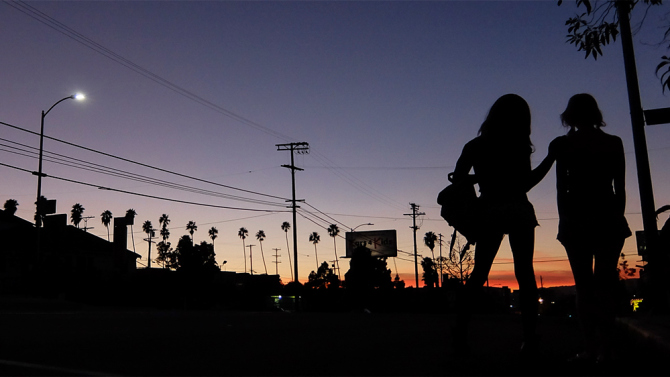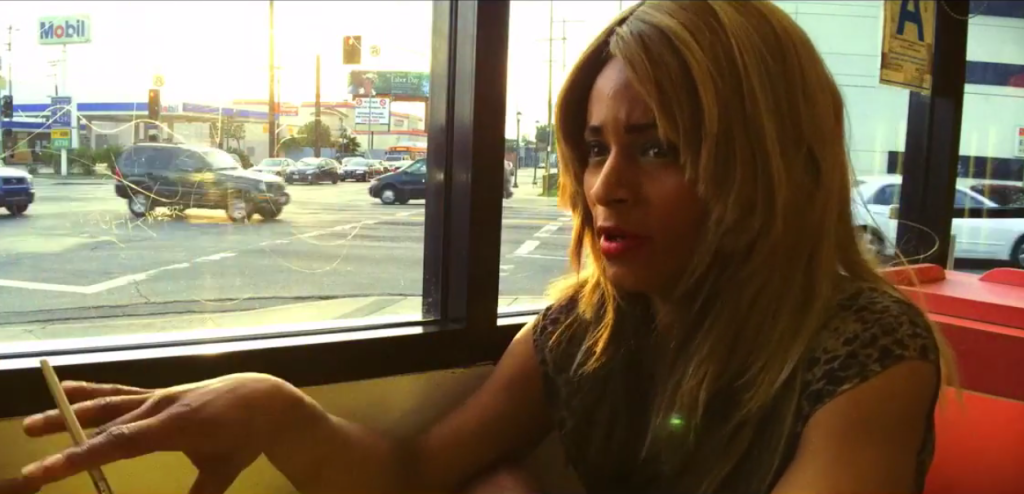Tangerine dreaming.
Kitana Kiki Rodriguez may not have been born a woman, but she was born to stomp down a Los Angeles footpath in high heels, hips swivelling, propelled forward by dubstep like some kind of avenging angel. This is one of the defining images of Sean Baker’s Tangerine, a film that otherwise defies definition. It is funny and sad and bursting with life.
No stranger to “the world’s oldest profession” after his 2012 feature Starlet, Baker is in fact brand new to the world of transgender prostitutes – as would be almost any filmmaker. On film, characters like Sindee (Rodriguez) and Alexandra (Mya Taylor) are more often seen getting booked in the background at police precincts than rising to the front and centre of their own stories, but that’s what happens in Tangerine, a film notable also for being shot entirely on iPhone 5’s. It’s Christmas Eve, and Sindee has just finished a month in jail only to learn from her BFF, over a celebratory donut, that her pimp boyfriend Chester (James Ransone) has been cheating on her with a natural born woman. Thus kicks off an Odyssey-like quest through fast food restaurants, welfare lines and motels that rent rooms by the hour, to find Chester’s new girlfriend and to get to the lounge in time for Alexandra’s 7 p.m. appearance on stage. Did we mention it’s Christmas Eve? That factors in to the parallel story of Razmik (Karren Karagulian), an amiable cab driver with a crush on Sindee and a wife, daughter and nagging mother-in-law at home.
If you like movies that provide moment after moment of “Well, I’ve never seen that before,” Tangerine is for you. It’s uncanny how easily Baker dives into an ecosystem of pimps and tricks and other shady characters with which one would assume he is otherwise unfamiliar. Equally uncanny is how he instantly identifies the pathos in each character, without letting the movie become unduly weighed down by it. Baker expertly layers moods like a DJ finding just the right counterintuitive pairing of songs, which is appropriate as this film pulses with a soundtrack that is calculated to make each image pop. Yes, there’s the driving intensity of the electronic songs, which punctuate Sindee’s determination to find her cheating beau and read him the riot act. But slapped in there suddenly is a track of such ethereal melancholy that it will cause you to pause and ponder the very concept of beauty. Watch out, though, because that won’t last long, and before you know it there’s an angry Latina hooker pulling a “skinny white bitch” by her hair down a busy Los Angeles street.
If Tangerine sounds like an assault on the senses, it is – in the best possible way. And it’s remarkable how well Baker’s primary tool, the iPhone 5, serves him in this regard. It’s not Hollywood quality cinematography, to be sure, but neither is it remotely distracting, and the iPhone creates this sort of fish eye quality to the lens that enhances this film’s unique perspective. One wouldn’t want Tangerine to look a tad better than it does, because then it would not be the movie that it is.
To get stalled on the music and the images is to look past probably this film’s most crucial aspect: its performers. There are moments when you can tell that Rodriguez and Taylor are not professional actors, but they are infrequent. Much more regularly, they capture something simultaneously real and outrageous, which is what makes possible the film’s inimitable blending of comedy and drama. The sassy interplay between the two leads carries whole scenes, yet never does Baker’s film make his characters the object of humour. Their humanity is always in the foreground, yet neither is the need for them to be viewed humanely some kind of topical bit of didacticism. The very matter-of-fact way we are inserted into this world and then led around through it – sometimes as though being pulled by our hair – is a testament to how obvious it should be that these characters’ reality is just as valid as anyone else’s. This movie respects them enough not to force them to openly struggle with the issues that must have helped shape who they have become. They are who they are and they don’t apologise for it.
If there’s anything about Tangerine that might leave a viewer puzzled, it’s the meaning of the title. I mean, the music of Tangerine Dream doesn’t even make an appearance here. But poetry is often best when it is merely evocative, without concrete meaning, and Tangerine is some of the best poetry 2015 has yet to offer. It is, in fact, a bit of a dream in its own right.
9/10
For more Reviews, click here. If you’re digging ReelGood, sign up to our mailing list for exclusive content, early reviews and chances to win big!


